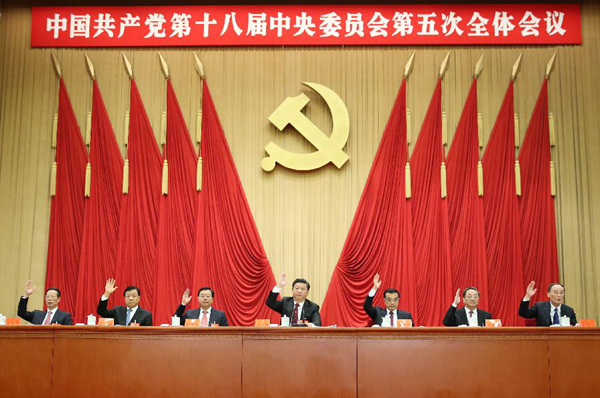China's Five Year Plan to achieve a 'moderately prosperous society'
- By John Ross
 0 Comment(s)
0 Comment(s) Print
Print E-mail China.org.cn, October 30, 2015
E-mail China.org.cn, October 30, 2015
|
|
|
Top Communist Party of China (CPC) and state leaders Xi Jinping (C), Li Keqiang (3rd R), Zhang Dejiang (3rd L), Yu Zhengsheng (2nd R), Liu Yunshan (2nd L), Wang Qishan (R) and Zhang Gaoli (L) attend the Fifth Plenary Session of the 18th CPC Central Committee, in Beijing, capital of China. The meeting was held from Oct. 26 to 29 in Beijing. [Lan Hongguang/Xinhua] |
To illustrate in fundamental terms how economic targets in the new Five Year Plan are correlated with social goals, consider life expectancy - which is the most sensitive indicator of human well-being as changes in this "sum up" the consequences of positives and negatives in overall economic, social, and environmental conditions. Internationally 73 percent of differences in life expectancy between countries are accounted for by per capita GDP differences. Therefore rising per capita GDP produces direct and indirect improvements in social conditions and is why the new Five Year Plan sets the goal of doubling income. It is also why China correctly continues to target a moderate to high growth rate.
But the new parameters created by China's development towards a "moderately prosperous society" substantially affect the new Five Year Plan. Under previous plans China made history's greatest achievements in overcoming poverty. It is staggering fact that since 1981, on World Bank data, China reduced the number of people living in internationally defined poverty by 728 million, while the whole of the rest of the world only achieved 152 million. It remains one of the most important goals to be accomplished during the 13th Five Year Plan that, as Xi Jinping announced, China will lift the final nearly 100 million people from poverty in the country.
But this gigantic historical achievement necessarily creates new challenges. When the decisive task facing China was to overcome low living standards the delivery of essentials such as housing, food and basic products was dominant and almost sufficient. International studies confirm that over 80 percent of increases in a population's consumption are due to GDP increases. Therefore, because economic growth's role in overcoming low living standards is decisive, almost everything became subordinated to it even when, for example, this resulted in environmental damage or unacceptable social inequality. But the social, cultural, environmental and other needs of a population which is achieving "moderate prosperity" are vastly more developed and complex.
There can be direct clashes between GDP growth and human well-being. For example highly polluting factories or power plants are cheaper than those which protect the environment, and can therefore be built more cheaply increasing GDP growth. Under new conditions, with China approaching its goal of eliminating poverty and low incomes, the necessary means of GDP growth remains extremely important but must be subordinated to overall human well-being - the goal. This is why as Hu Angang, one of China's leading economists and an adviser on drawing up the new plan, put it: "In the process of China's reform and opening-up, the five-year plan has been remade… it has become a program for human development, or citizens' needs in all aspects."
Western media failures to admit China's historically unprecedented success in overcoming low incomes means it inaccurately focuses solely on growth rates or individual issues such as the "one child policy" - a classic case of "being unable to see the wood for the trees." In contrast China's analysis of the new plan's role in achieving a "moderately prosperous society in all respects" is spot-on in its framework.
The writer is a columnist with China.org.cn. For more information please visit:
http://www.china.org.cn/opinion/johnross.htm
Opinion articles reflect the views of their authors, not necessarily those of China.org.cn.







Go to Forum >>0 Comment(s)